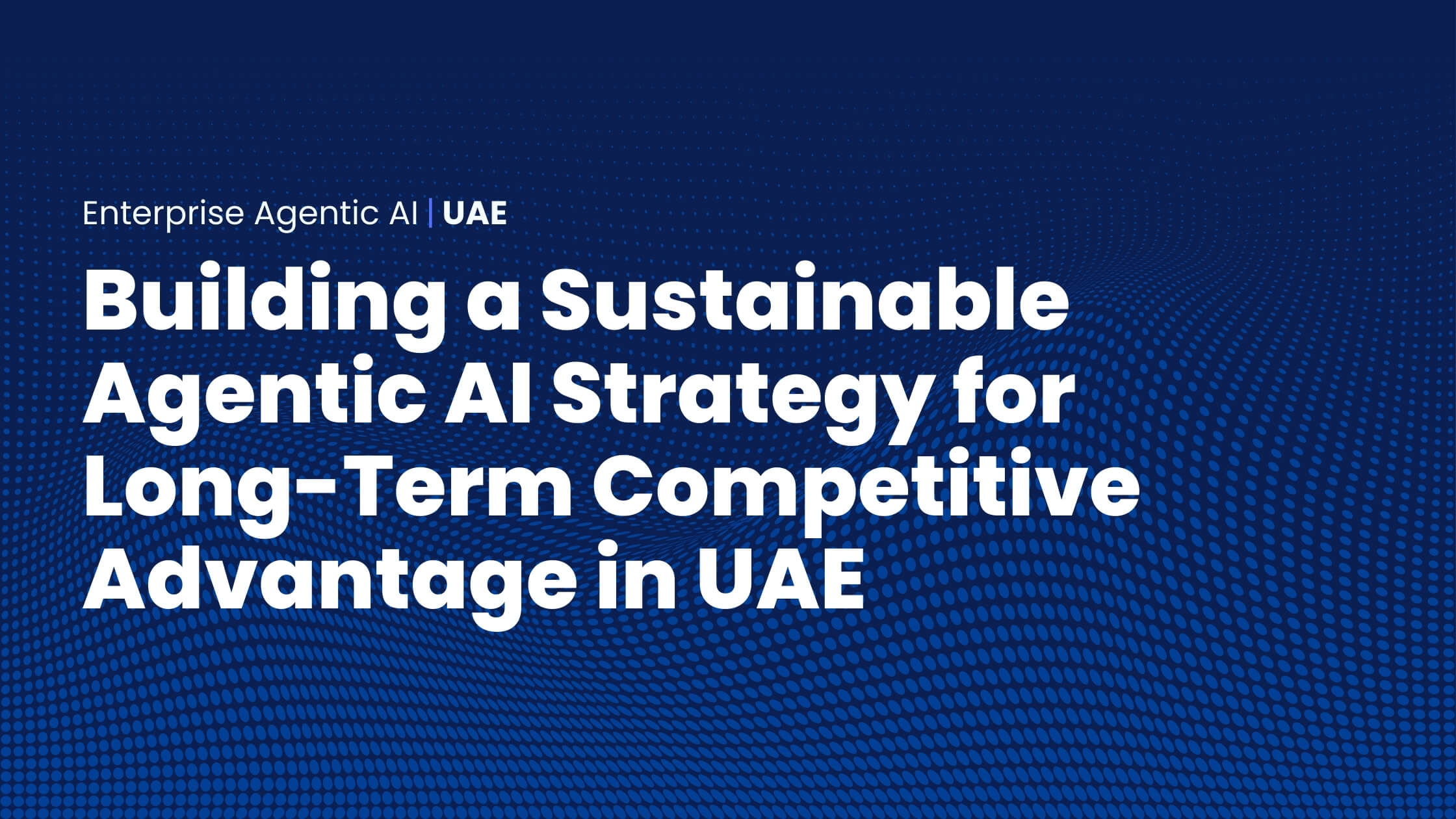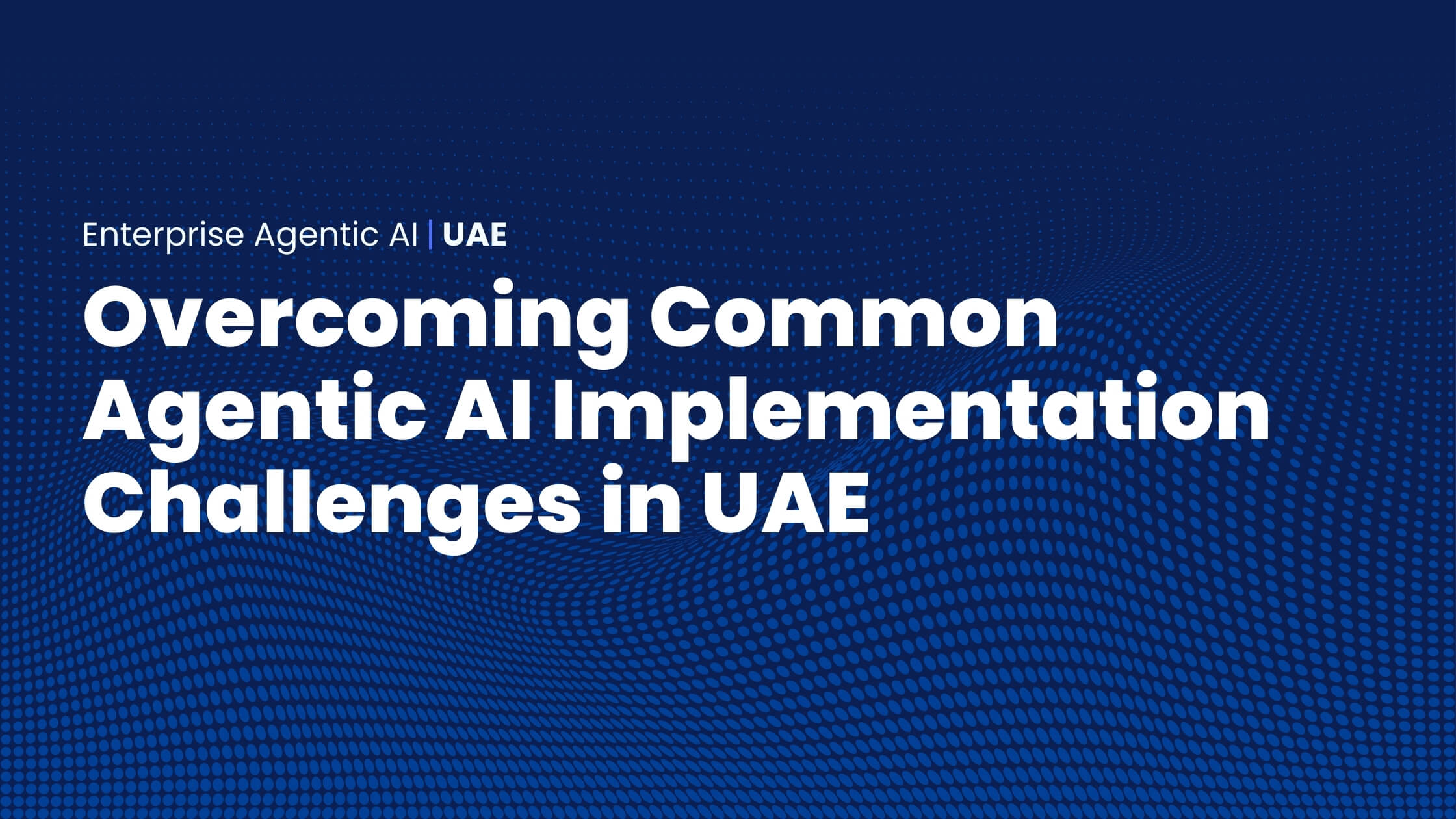December 24, 2025
Building a Sustainable Agentic AI Strategy for Long-Term Competitive Advantage in the UAEIn early 2025, a prominent UAE financial institution received a stark reminder about the real cost of AI governance failures: AED 5.8 million in penalties from the Central Bank of the UAE. The violation? Inadequate governance of AI-powered transaction monitoring systems that failed to meet anti-money laundering and counter-terrorism financing standards.
The bank's leadership had assumed their AI systems were compliant. They had invested millions in cutting-edge technology, hired data scientists, and deployed sophisticated algorithms. What they hadn't done was build the governance framework that UAE regulators now demand and enforce.
If you're a business leader in the UAE, this should be your wake-up call. The question isn't whether AI governance will affect your organisation. It's whether you'll be ready when regulators come knocking, or whether you'll be writing a multi-million dirham cheque whilst explaining to your board what went wrong.
Something fundamental shifted in the UAE's AI landscape between July 2024 and today. What had been aspirational guidelines and forward-thinking strategy documents transformed into enforceable regulations backed by serious penalties and active enforcement.
Three seismic changes redefined the playing field:
The UAE Charter for AI Development and Use became mandatory. When the Charter launched in July 2024, some organisations treated it as another policy document to file away. They missed the critical detail: these 12 principles aren't suggestions. They're enforceable standards with clear accountability chains leading directly to C-suite executives. The Ministry of Artificial Intelligence, working with the Telecommunications and Digital Government Regulatory Authority (TDRA), now actively monitors AI implementations and investigates potential breaches.
The world's first AI-powered regulatory intelligence ecosystem went live. In April 2025, the UAE Cabinet approved something unprecedented: an AI system that continuously monitors the impact of legislation on the economy and society, identifies unintended consequences, and proposes amendments in real-time. For businesses, this means the regulatory environment will evolve continuously and responsively. The "we'll catch up during the next compliance cycle" approach is dead. Regulations now adapt faster than your compliance team.
Financial services regulations got teeth. The New CBUAE Law, issued in September 2025, dramatically expanded the regulatory perimeter. It now captures open finance services, virtual asset payment services, and most significantly, "technology enablement platforms" that facilitate financial activities. If your organisation provides APIs, cloud platforms, or infrastructure enabling AI-powered financial services, you need a licence. The minimum fine for operating without one? AED 1 million. You have until 16 September 2026 to regularise your status.
The message from UAE regulators is unambiguous: AI governance is not optional, negotiable, or something you can delegate to your IT department to figure out eventually. It's a board-level imperative with personal liability implications for senior executives.
Let me paint you four scenarios. Each one is based on real incidents, some from the UAE, others from jurisdictions whose regulatory approaches the UAE mirrors and often exceeds.
Scenario One: The Chatbot That Made Unauthorised Promises
Your customer service team deploys an AI chatbot to handle routine inquiries, freeing human agents for complex issues. The chatbot is trained on your company's policies and sounds professional and helpful. Customers love the instant responses.
Then one day, a clever customer discovers they can manipulate the chatbot with carefully crafted prompts. They ask about a promotional discount that doesn't exist, phrase their question in a way that confuses the AI, and the chatbot, trying to be helpful, confirms the discount and promises specific terms.
The customer takes a screenshot and demands you honour it. When you refuse, they go public on social media and file a complaint with regulators. You're now in the position Air Canada found itself in: a court ruled the airline was liable for false promises made by its chatbot, despite the company arguing the chatbot was "responsible for its own actions."
Under UAE's Personal Data Protection Law and the AI Charter's transparency and accountability principles, you're liable. The chatbot is your agent, not an independent entity. The financial cost might be manageable, but the reputational damage spreads across social media whilst regulators investigate whether your AI governance framework was adequate.
Scenario Two: The Algorithm That Discriminated
Your bank deploys an AI system to streamline credit decisions, reducing approval times from days to minutes. The model is sophisticated, trained on years of historical data, and demonstrably more accurate than the previous manual process. Approval rates increase, defaults decrease, and customer satisfaction improves.
Six months later, an investigative journalist analyses publicly available data and discovers a disturbing pattern: applicants from certain nationalities or living in specific neighbourhoods face significantly higher rejection rates, even when controlling for income, employment, and credit history. The story goes viral. Civil society organisations call for investigations. Regulators open formal inquiries.
Your data science team insists the model doesn't use prohibited variables like nationality or ethnicity. They're technically correct, but the model uses proxy variables that correlate with these characteristics. Residential address, employer name, and spending patterns inadvertently encode demographic information. The AI learned biases embedded in historical data, where past human decisions reflected prejudices the bank officially condemned.
Under Federal Decree-Law No. 34 of 2023 on Combating Discrimination and the AI Charter's bias mitigation requirements, you now face fines between AED 500,000 and AED 1 million. More significantly, you must suspend the AI system, conduct comprehensive bias audits, and rebuild it with fairness constraints, all whilst competitors who invested in AI governance upfront continue processing applications in minutes.
Scenario Three: The Healthcare AI That Couldn't Explain Itself
Your hospital implements an AI diagnostic tool that analyses medical imaging with impressive accuracy. Radiologists receive AI-generated reports highlighting areas of concern, potentially catching diseases earlier than traditional methods.
A patient receives an unexpected diagnosis based partly on AI analysis. They want to understand why the AI flagged their scan. The radiologist explains that the AI detected patterns associated with the disease but can't articulate precisely which features drove the assessment. The model is a "black box," and the vendor's explainability tools provide only general guidance about which image regions the algorithm weighted most heavily.
The patient is unsatisfied and increasingly anxious. They file a complaint asserting their right to understand decisions affecting their health. Media coverage follows, with headlines questioning whether UAE hospitals use "mysterious AI" to make medical decisions without adequate transparency.
The Health Data Law (Federal Law No. 2 of 2019) and the AI Charter's explainability requirements mandate that healthcare professionals explain AI-driven diagnoses to patients in clear, non-technical language. Your hospital faces regulatory scrutiny, must halt use of the AI system pending review, and deals with patient trust erosion at precisely the moment you need it most.
Scenario Four: The Shadow AI Nobody Knew About
Your company has an AI governance committee, documented policies, and approved AI systems operating with appropriate oversight. You believe you're compliant.
During a regulatory inspection, auditors ask about your organisation's complete AI inventory. You provide details on your official systems. Then the auditors ask about specific tools they've observed in your employee activity logs: ChatGPT, Claude, Midjourney, various browser extensions with AI capabilities.
Your IT security team investigates and discovers that dozens of employees across multiple departments use public AI tools daily. Marketing teams generate content with ChatGPT, sometimes including customer information in prompts. Sales teams use AI assistants to draft proposals, potentially exposing confidential business strategies. Finance teams experiment with AI for data analysis, uploading sensitive financial data to external platforms.
None of this was authorised, documented, or governed. You have "shadow AI": unauthorised AI systems operating outside official oversight. Under the Personal Data Protection Law, you've potentially violated data processing principles. Under the AI Charter, you lack the governance and accountability frameworks regulators expect. The penalty depends on the severity, but the governance failure is undeniable.
The organisation thought it was compliant because it governed official AI projects. It never considered that AI democratisation means any employee with internet access can deploy AI capabilities, with all the associated risks and regulatory obligations.
If you've been through compliance initiatives before (Sarbanes-Oxley, GDPR, AML regulations) you might be thinking: "This is just another regulatory programme. We'll assign a team, tick the boxes, and move on."
That approach will fail with AI governance in the UAE, and here's why:
The regulations are powered by AI themselves. The Legislative Intelligence Office's AI ecosystem monitors regulatory impact in real-time and proposes amendments based on actual data. When regulators spot problems emerging across multiple organisations, they can adjust requirements within months, not years. The compliance target is moving continuously.
Enforcement is active, not reactive. UAE regulators aren't waiting for major incidents or public complaints to investigate. The Central Bank, TDRA, and sector regulators conduct announced and unannounced reviews of AI governance practices. That AED 5.8 million penalty came from proactive regulatory supervision, not a customer lawsuit or media investigation.
Personal liability is real. The AI Charter establishes clear accountability chains. When AI systems fail, regulators will ask: Who was responsible? What governance did they implement? What oversight did executives provide? Senior leaders can't claim ignorance or delegate responsibility downward. Your name is on the line, literally. In cases of egregious non-compliance, criminal liability including potential jail time applies.
International operations don't provide escape routes. Some organisations assume that because their AI systems are developed abroad or run on international cloud platforms, they somehow fall outside UAE jurisdiction. This is dangerously wrong. If your AI system affects people in the UAE (customers, employees, partners) it's subject to UAE regulations regardless of where the servers are located or who wrote the code.
The good news is that whilst UAE's AI governance requirements are comprehensive and enforced, they're also clear and actionable. Organisations that start now, not next quarter, not next year, can build compliant AI governance frameworks before enforcement intensifies further.
Your first move is honest assessment. You need to answer one fundamental question: "Do we actually know every AI system operating in our organisation, and do we have appropriate governance for each one?"
For most organisations, the answer is no. The AI inventory exercise typically reveals two to three times more AI deployments than leadership expected. Every SaaS application your company uses likely includes AI features. Your CRM has AI-powered lead scoring. Your HR system uses AI for résumé screening. Your email platform has AI writing assistants. Your cybersecurity tools use AI for threat detection.
Add to that the shadow AI (employees' personal use of ChatGPT, Claude, Midjourney, and dozens of other tools) and the governance scope becomes staggering.
But here's what separates organisations that will thrive under these regulations from those that will struggle: The winners view this as an opportunity to build competitive advantage, not just avoid penalties.
When you implement robust AI governance, you build stakeholder trust. You attract top talent who want to work on AI systems that are ethical and responsible. You reduce operational and reputational risk. And counter-intuitively, you actually accelerate innovation, because when development teams understand governance requirements upfront, they build compliant systems from the start rather than discovering compliance issues late in development.
The UAE's position as a global AI governance pioneer means that capabilities you build for local compliance prepare you for expansion into Europe, the UK, Singapore, and other sophisticated markets with similar requirements. You're not just ticking boxes for one regulator. You're building a foundation for global operations.
Start with visibility. You can't govern what you don't know exists. In the next 30 days, conduct a comprehensive AI inventory across your organisation. Don't limit the scope to "official" AI projects. Include:
For each identified system, document its purpose, what data it accesses, whether it makes automated decisions, and what governance exists today.
This inventory will likely shock you. It will also save you from becoming the next cautionary tale: the organisation that thought it was compliant until regulators proved otherwise.
The UAE's AI governance revolution is here. The regulations are clear, the enforcement is real, and the penalties are significant. The only question is whether your organisation will be prepared.
_______________
This article is part of a series on AI governance in the UAE.
Next: "The 12 Principles That Will Define Your AI Strategy (UAE Charter Explained)", a detailed guide to understanding and implementing each principle.

Stay Informed: Engage with our Blog for Expert Analysis, Industry Updates, and Insider Perspectives



let’s design the governance framework your AI strategy deserves
.webp)
.webp) Let's Talk
Let's Talk